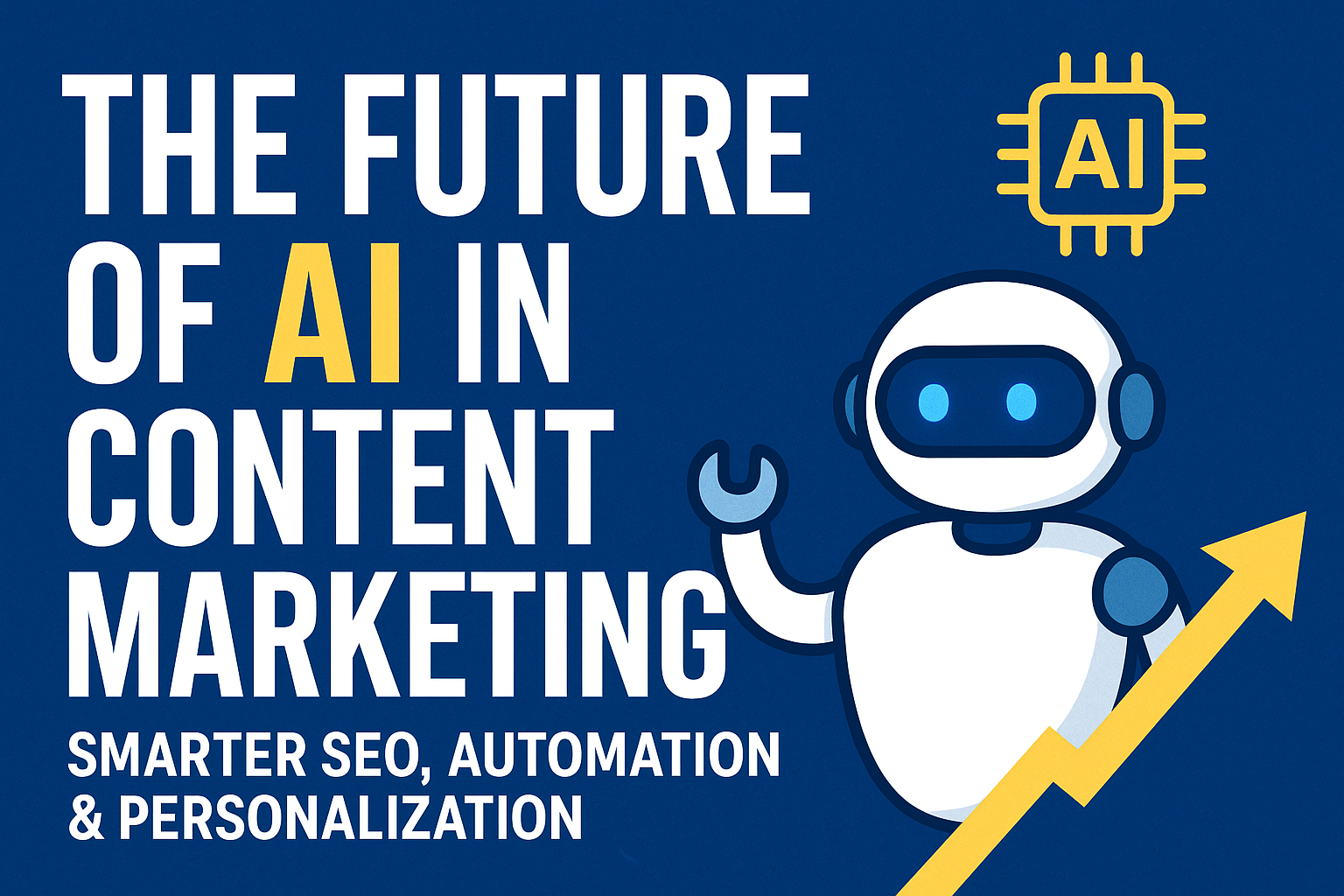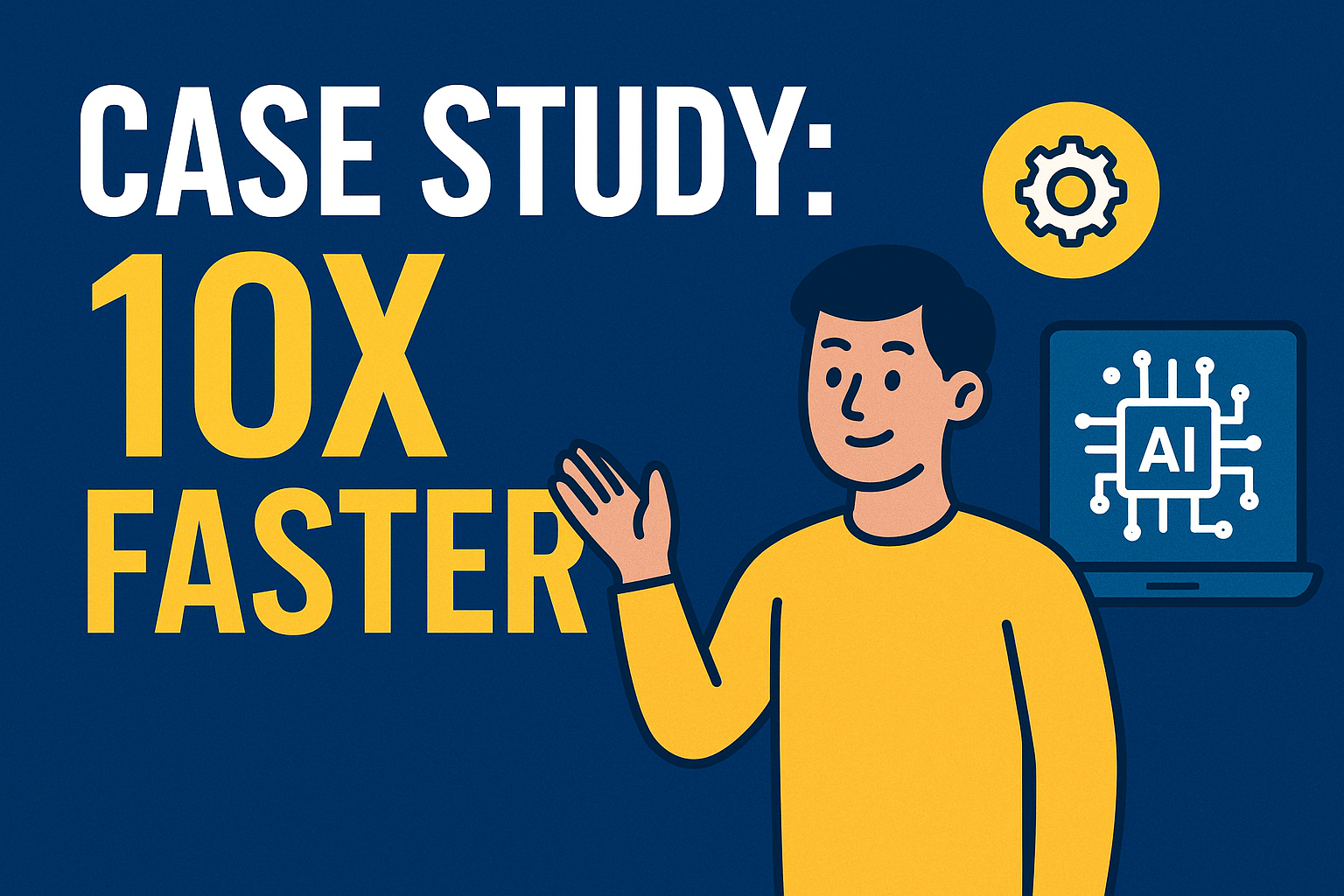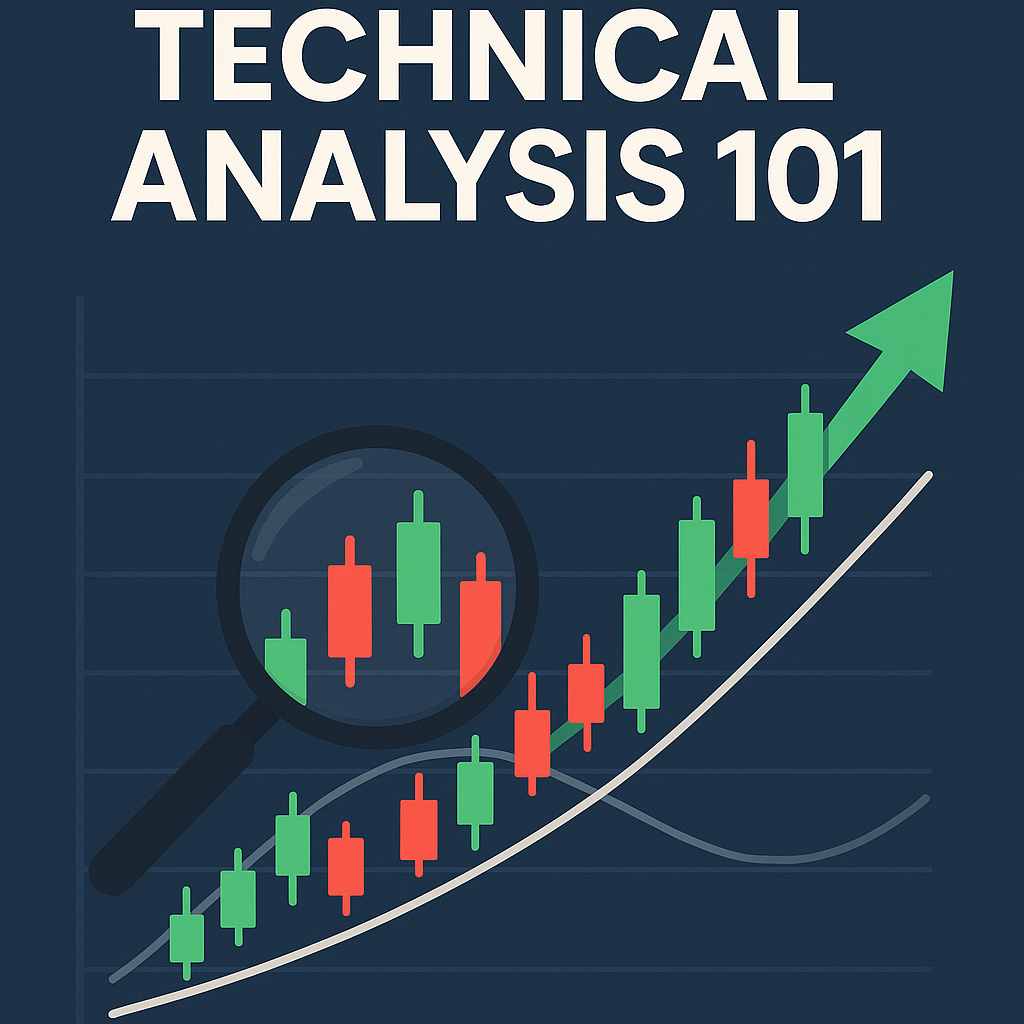
Struggling to keep up with content marketing trends? AI is changing the game by offering smarter SEO, faster automation, and better personalization. This blog will show you how AI tools can save time, boost engagement, and improve your marketing results.
Stick around; this could transform your strategy!
Key Takeaways
- AI tools like ChatGPT, Jasper, and Adobe Sensei help create content faster and improve quality with machine learning.
- AI-powered SEO tools such as Surfer SEO and Clearscope boost rankings by optimizing keywords and readability in real time.
- Automation saves time by streamlining tasks like email campaigns, audience targeting, and performance tracking using platforms like Mailchimp or ActiveCampaign.
- AI enables hyper-personalization through data-driven segmentation, as shown by Spotify’s custom playlists or Netflix’s show recommendations.
- Ethical concerns include bias in data training and privacy issues; businesses must follow laws like GDPR to protect consumer trust.
AI-Driven Content Creation

AI is changing how we create content. It speeds up writing and helps make ideas stronger with tools like machine learning models.
Generative AI for faster content production
Generative AI speeds up content creation by automating tasks that once took hours or days. Tools like large language models can draft blogs, emails, and Instagram captions in minutes.
Brands using generative AI save time while cutting operational costs significantly.
“AI marketing tools deliver results in seconds compared to manual methods.”
Platforms such as Adobe Sensei and Jasper help marketers create trending topics with minimal effort. This shift allows teams to focus more on strategy rather than wordsmithing.
Next comes improving quality through machine learning.
Improving content quality through machine learning
Machine learning boosts content quality by analyzing real-time data and user behavior. It identifies patterns, highlighting what works best for engagement. AI-powered tools fine-tune language, tone, and structure to make content more effective.
For example, platforms like Adobe Sensei enhance clarity and relevance by using deep learning models.
Recommendation engines suggest ideas based on trending topics or audience preferences. These systems learn from consumer habits to match messaging with expectations. This creates personalized content that ranks higher on AI-first search platforms like TikTok or LinkedIn while improving readability for humans too.
Case Study: How I Used AI Tools to Create Content 10x Faster
AI tools like ChatGPT and Jasper made writing faster than ever. I used them to turn ideas into full posts in minutes. Generative AI handled outlines, drafts, and even suggestions for catchy titles.
Instead of spending hours on one blog, I completed several in the same time.
These tools didn’t just speed things up; they improved my content’s quality too. Machine learning features suggested better keywords for SEO and ways to fix weak sections instantly.
Brands like Primotech also showed how scalable workflows through AI raised productivity levels across teams by more than double.
Enhancing Search Engine Optimization (SEO) with AI
AI makes SEO smarter and faster. It helps spot trends, fine-tune strategies, and keep content on top of search results.
AI-powered keyword research
AI-powered tools like Semrush and MarketMuse analyze user behavior to find high-value keywords. They use predictive analytics to forecast search trends, helping marketers target the right audience.
These tools quickly suggest terms based on user intent, making content more effective.
Natural Language Processing (NLP) platforms such as Frase or Google NLP API go deeper. They study semantic relevance, identifying related keywords that match how people actually search online.
This boosts rankings and aligns with consumer needs efficiently.
Real-time SEO optimization tools
Keyword research sets the stage, but real-time SEO tools sharpen the edge. Platforms like Surfer SEO and NeuronWriter adjust content on-the-fly, tracking performance as you write. These tools scan for readability, keyword density, and user intent instantly.
Clearscope excels at aligning your draft with search trends, offering precise suggestions to fill gaps in relevance. Schema markup generators supercharge search engines’ understanding of your site’s data too.
Automated audits from Screaming Frog or Alli AI act like 24/7 health inspectors for technical issues. They flag broken links, slow loading speeds, or duplicate content without delay.
This constant monitoring ensures that ranking factors remain aligned with Google’s algorithms over time. For brands investing in long-term success across platforms like TikTok or social media channels linked to sites, these insights are golden tickets for better visibility and engagement rates.
Automation in Content Marketing
Automation makes content marketing quicker and smarter. It saves time, boosts targeting, and keeps your audience hooked without breaking a sweat.
Streamlining content distribution
AI automates tasks like email campaigns and social posts, saving hours of work. Tools such as Mailchimp and ActiveCampaign handle scheduling while ensuring content reaches the right audience fast.
Social platforms powered by machine intelligence optimize ad placements for better click-through rates.
Platforms use real-time data from user preferences to decide where and when to share content. For example, AI knows the best times to post on TikTok or Instagram based on consumer behavior patterns.
This helps brands engage their audience without wasting resources or missing key moments in the customer journey.
Automating audience targeting
After distributing content, reaching the right audience becomes crucial. AI-powered tools like programmatic advertising take charge by placing ads on platforms where they’ll get the most impact.
This boosts efficiency and reduces wasted ad spend.
AI segments audiences into highly specific groups using data analysis from purchase patterns, customer behavior, and sentiment analysis. For example, it can identify TikTok-loving Gen Z users or loyalty-driven older customers for customized campaigns.
This precision makes marketing automation smoother and more effective at every touchpoint in a campaign.
AI-driven performance tracking
AI tools analyze campaign performance in real time. They link actions, like targeted advertisements or ad campaigns, with key metrics such as click-through rates (CTR), cost per acquisition (CPA), and bounce rates.
For example, AI-powered dashboards show which content brings more customer engagement or where users drop off on a landing page.
Marketers get faster insights into consumer behavior and preferences without manual work. These platforms can monitor audience sentiment while adjusting strategies automatically for better results.
This level of automation boosts efficiency within marketing strategies by offering smarter decisions instantly.
Personalization at Scale
AI makes it easy to deliver content that feels custom-made for each person, boosting engagement like never before.
Data-driven customer segmentation
Data analysis helps marketers categorize audiences by behavior and intent. Tools powered by artificial intelligence can group customers based on how they browse, buy, or interact. For example, Spotify uses this method to create customized playlists for millions of users daily.
Predictive analytics also plays a key role here, helping brands forecast what their audience might want next.
This type of segmentation allows highly targeted campaigns that feel personal. A company can send ads or emails customized to individual preferences instead of generic messages for everyone.
This increases engagement and strengthens customer relationships over time. Next comes crafting campaigns well-suited for each segment’s needs effectively!
Creating hyper-targeted campaigns
AI helps brands craft campaigns that feel personal. By using data analytics and machine learning, marketers can sort customers into clear groups based on behavior, likes, and clicks.
These customer segments allow companies to create ads or emails that match specific needs. For example, an e-commerce store could show different promotions to a loyal repeat-buyer versus someone browsing for the first time.
This personalization increases click-through rates and keeps users hooked.
Smart tools like AI-powered CRM systems predict when a customer might leave or stop engaging. Automated messages can then be sent at the perfect time to win them back. Netflix uses similar methods by analyzing what viewers watch to recommend shows they’ll love next.
With these predictive models, companies stay ahead of trends while improving customer journeys in real-time.
Future Trends in AI Content Marketing
Expect AI to reshape content marketing with smarter tools, deeper insights, and new ways to engage audiences like never before.
Interactive and immersive content experiences
Dynamic UX powered by artificial intelligence tailors websites in real time. It changes headlines, meta tags, and descriptions instantly based on user actions. This keeps the experience fresh and personalized.
For instance, an AI-enabled retail site can show recommendations matching a shopper’s past behavior.
AI transforms content into engaging experiences using tools like virtual reality. Imagine a travel brand offering 360-degree tours of destinations before booking. Features like this increase customer engagement while boosting click-through rates and loyalty.
Voice and visual search optimization
Voice search is transforming how users find content. Nearly 20% of people worldwide rely on voice commands daily. It means optimizing for natural, conversational phrases in your SEO strategy is no longer optional.
Focus on long-tail keywords and questions like “What’s the best recipe for apple pie?” AI tools, such as Google Assistant or Alexa, play a massive role in this shift by delivering quick answers to spoken queries.
Visual search is equally impactful now. AI-powered tools with computer vision analyze images and videos for better tagging and indexing online. Platforms like Pinterest Lens make shopping from photos seamless—users snap a picture and get product suggestions instantly.
Accurate alt text descriptions also improve image visibility in searches while boosting accessibility efforts across websites.
Next comes predictive analytics shaping audience needs…
Advanced predictive analytics for audience needs
AI spots patterns that humans often miss. Predictive analytics examines consumer behavior, helping marketers understand what their audience wants before they want it. For example, by analyzing search data and social media activity, AI can predict trends or suggest content topics likely to perform well.
Brands use these insights for smarter campaigns. Tools powered by predictive analysis improve customer engagement with personalized content based on real-time data. This means better user experiences and higher click-through rates.
Personalized strategies lead directly into creating hyper-targeted campaigns in the next section.
Challenges in AI Content Marketing
AI can supercharge marketing, but it’s not all smooth sailing. Balancing machine efficiency with human creativity is a tricky tightrope to walk.
Balancing automation with human creativity
Machines handle repetitive tasks quickly, but they lack human intuition. AI-powered tools excel at data analysis, content optimization, and audience segmentation. Still, they can’t replace the spark of creativity humans bring to storytelling or campaigns.
Relying solely on automation risks losing the personal touch that builds customer loyalty. For example, generative AI might draft an article in minutes, but a human refines its tone to match brand voice.
Success lies in teamwork between artificial intelligence and skilled marketers combining speed with emotion-driven ideas.
Addressing ethical concerns and bias in AI
AI can sometimes make mistakes. It may misinterpret data or produce biased outputs if trained on incomplete or faulty information. For example, AI-generated content might exclude diverse perspectives or reflect harmful stereotypes without proper oversight.
Such issues harm both brands and their audiences.
Ethical governance is vital to manage these challenges. Laws like GDPR and CCPA push companies to handle data responsibly, respecting user privacy while creating personalized content.
Regular audits of AI tools can also reduce bias in decision-making processes. Managing bias ensures better customer engagement and balanced outcomes for businesses using AI-powered tools.
Managing data privacy and security is crucial in automation next.
Managing data privacy and security
Data privacy laws, like GDPR, press businesses to protect customer data at all costs. AI tools must follow these regulations by keeping customer information safe and private. Marketing teams should use platforms that support clear citation rules while sticking to Google’s or OpenAI’s guidelines.
Failing in this area can harm trust and lead to hefty fines.
AI-powered marketing depends on sensitive consumer data. Encryption, secure storage, and limited access are key practices for handling this information safely. Tools such as CRMs need regular updates to fight security risks like breaches or leaks.
Careful management creates a strong base for automation in content marketing tasks up next!
Tips for Effective AI Integration in Content Marketing
Start small with simple AI tools that fit your goals. Keep human creativity in the mix to keep content fresh and relatable.
Choosing the right AI tools
Pick AI tools that match your goals. For content creation, Jasper or ChatGPT can speed up writing. Adobe Sensei helps with personalized content and better customer experiences. Salesforce Einstein powers data-driven marketing by offering deep consumer insights.
For SEO, use Surfer SEO or Clearscope to improve visibility. NeuronWriter simplifies keyword research for higher rankings. Tools like schema markup generators enhance search engine performance in real-time.
Choose wisely based on needs, not hype!
Building collaboration between AI and human teams
AI tools perform best with clear input from skilled teams. Training employees to use AI software like Adobe Sensei or generative pre-trained transformers ensures smooth workflow. Teams can learn to manage marketing automation, boost SEO, and create ai-generated content faster.
Using AI experts for guidance helps bridge gaps. Change management strategies and detailed documentation support team adoption of new tools. Combining human creativity with machine learning produces personalized content that connects better with audiences.
This blend enhances customer engagement while saving time.
Conclusion
AI is reshaping content marketing faster than ever. From smarter SEO strategies to hyper-personalized campaigns, it’s a game-changer. Businesses can now create better content, automate tasks, and predict customer needs with ease.
Still, human creativity remains key in crafting meaningful connections. The future belongs to those who balance tech power with genuine storytelling.
For an in-depth look at how AI can revolutionize content creation, read our case study on using AI tools to create content 10x faster.
FAQs
1. What role does AI play in content marketing?
AI plays a big part in content creation, automating tasks like SEO optimization and personalizing customer engagement. It uses data analysis and predictive analytics to improve strategies for better results.
2. How can generative AI improve personalized content?
Generative AI tailors content by analyzing user preferences, consumer behavior, and customer insights. This creates more relevant brand experiences that resonate with individual audiences.
3. Are there ethical concerns about using artificial intelligence in marketing?
Yes, the ethics of AI are important to consider. Issues like data privacy, GDPR compliance, and AI bias must be addressed when using AI-powered tools for marketing automation or demand forecasting.
4. Can machine learning help with voice search optimization?
Absolutely! Machine learning enhances voice search optimization by predicting what users might ask based on past searches and consumer preferences.
5. How do social media platforms use artificial intelligence for engagement?
Platforms like TikTok use artificial intelligence to analyze user behavior, personalize feeds, optimize ad placements, and boost customer relationship management efforts.
6. Is there any financial benefit to adopting AI tools in marketing?
Yes! Businesses may qualify for tax credits or tax exemptions when investing in advanced technologies like AI-powered tools or contaminated site cleanups such as brownfields projects under specific programs related to corporate tax rules or income tax rates adjustments aimed at innovation incentives.



![AI Tools for Social Media Creators: Instagram, TikTok & LinkedIn [2025]](https://niftynautanki.com/wp-content/uploads/2025/09/AI-009-360x180.png)


![AI Writing Tools Compared: ChatGPT vs Jasper vs Writesonic [2025]](https://niftynautanki.com/wp-content/uploads/2025/09/img-00998-360x180.png)



